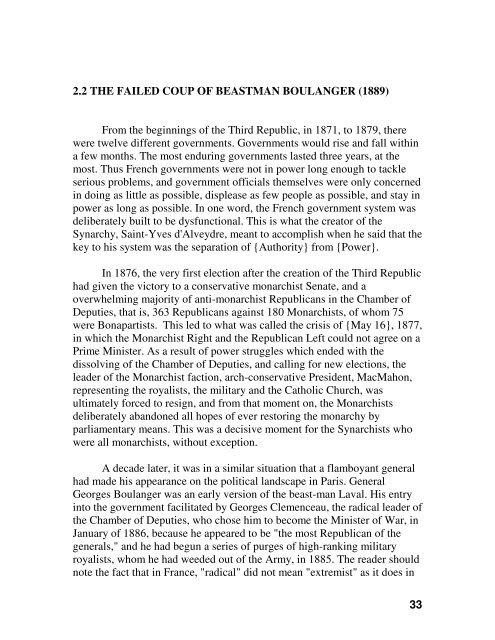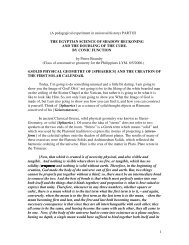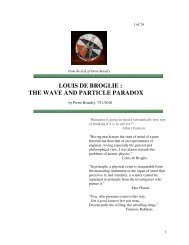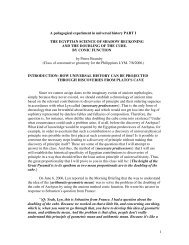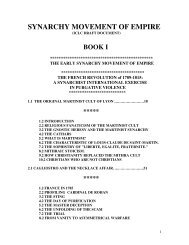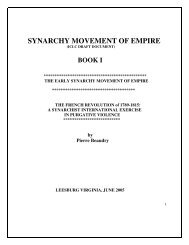synarchy movement of empire book ii - Pierre Beaudry's Galactic ...
synarchy movement of empire book ii - Pierre Beaudry's Galactic ...
synarchy movement of empire book ii - Pierre Beaudry's Galactic ...
You also want an ePaper? Increase the reach of your titles
YUMPU automatically turns print PDFs into web optimized ePapers that Google loves.
2.2 THE FAILED COUP OF BEASTMAN BOULANGER (1889)<br />
From the beginnings <strong>of</strong> the Third Republic, in 1871, to 1879, there<br />
were twelve different governments. Governments would rise and fall within<br />
a few months. The most enduring governments lasted three years, at the<br />
most. Thus French governments were not in power long enough to tackle<br />
serious problems, and government <strong>of</strong>ficials themselves were only concerned<br />
in doing as little as possible, displease as few people as possible, and stay in<br />
power as long as possible. In one word, the French government system was<br />
deliberately built to be dysfunctional. This is what the creator <strong>of</strong> the<br />
Synarchy, Saint-Yves d'Alveydre, meant to accomplish when he said that the<br />
key to his system was the separation <strong>of</strong> {Authority} from {Power}.<br />
In 1876, the very first election after the creation <strong>of</strong> the Third Republic<br />
had given the victory to a conservative monarchist Senate, and a<br />
overwhelming majority <strong>of</strong> anti-monarchist Republicans in the Chamber <strong>of</strong><br />
Deputies, that is, 363 Republicans against 180 Monarchists, <strong>of</strong> whom 75<br />
were Bonapartists. This led to what was called the crisis <strong>of</strong> {May 16}, 1877,<br />
in which the Monarchist Right and the Republican Left could not agree on a<br />
Prime Minister. As a result <strong>of</strong> power struggles which ended with the<br />
dissolving <strong>of</strong> the Chamber <strong>of</strong> Deputies, and calling for new elections, the<br />
leader <strong>of</strong> the Monarchist faction, arch-conservative President, MacMahon,<br />
representing the royalists, the military and the Catholic Church, was<br />
ultimately forced to resign, and from that moment on, the Monarchists<br />
deliberately abandoned all hopes <strong>of</strong> ever restoring the monarchy by<br />
parliamentary means. This was a decisive moment for the Synarchists who<br />
were all monarchists, without exception.<br />
A decade later, it was in a similar situation that a flamboyant general<br />
had made his appearance on the political landscape in Paris. General<br />
Georges Boulanger was an early version <strong>of</strong> the beast-man Laval. His entry<br />
into the government facilitated by Georges Clemenceau, the radical leader <strong>of</strong><br />
the Chamber <strong>of</strong> Deputies, who chose him to become the Minister <strong>of</strong> War, in<br />
January <strong>of</strong> 1886, because he appeared to be "the most Republican <strong>of</strong> the<br />
generals," and he had begun a series <strong>of</strong> purges <strong>of</strong> high-ranking military<br />
royalists, whom he had weeded out <strong>of</strong> the Army, in 1885. The reader should<br />
note the fact that in France, "radical" did not mean "extremist" as it does in<br />
33


